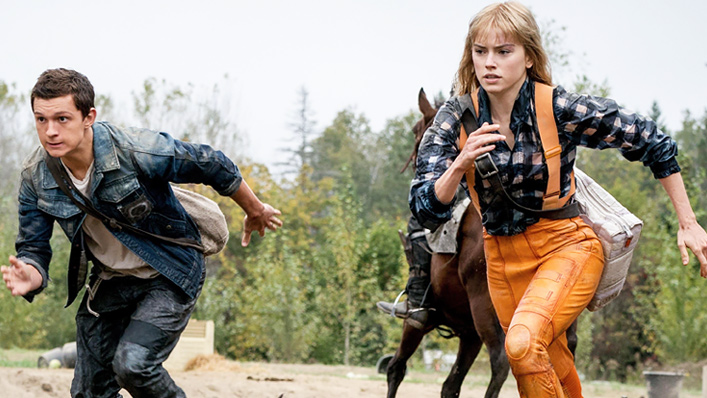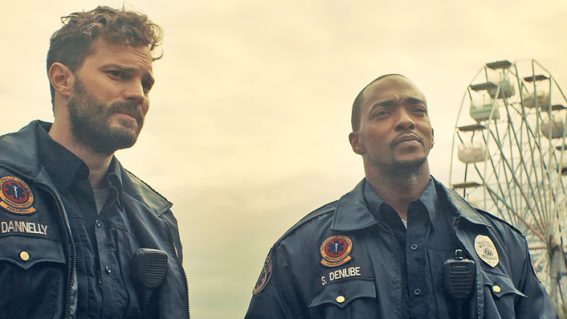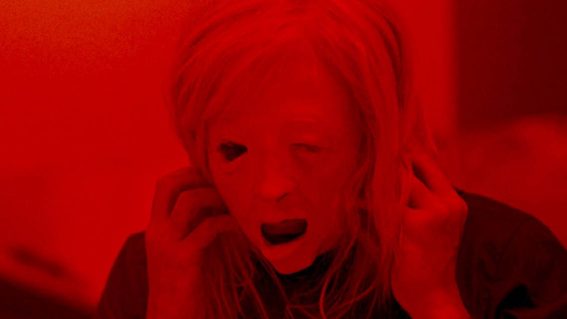Preposterous sci-fi Chaos Walking lives up to its title, if not potential
Daisy Ridley can’t stop hearing Tom Holland’s thoughts in occasionally entertaining pic.

A world with unfiltered access to everybody’s thoughts, no matter how stupid or inconsequential? Ridiculous post-apocalyptic adventure Chaos Walking (now in cinemas) has a truly dystopian concept. Here’s critic Luke Buckmaster’s review.
Chaos Walking, director Doug Liman’s cack-handed but occasionally entertaining ‘how bad is this gonna get?’ sci-fi movie, is based in a world where men’s thoughts can be heard, sometimes seen, by whoever is unlucky enough to be around at the time, including and especially the audience. You know those lovely, quiet moments in films, when the camera captures a character in silent contemplation? Or a lull in conversation while somebody ponders what to say next?
See also:
* All movies now playing
* New to NZ streaming services this month
* The best movies of 2020
They don’t exist in this movie. Certainly not for Todd (Tom Holland), who we meet in a forest by himself, ‘alone’ with his thoughts. Inverted commas because by god these thoughts keep him company—less an angel or a devil on his shoulders than a blathering, sometimes paranoid idiot.
Adapted from a popular YA book series by Patrick Ness, the premise of Chaos Walking (which could have been called Chaos Talking, or Chaos Thinking, or Just Plain Chaos) runs counter to those of recent dystopian hits Birdbox and A Quiet Place. The former was based in a world where looking can kill you, the latter where Emily Blunt and John Krasinski say “shoosh” a lot.

Spectacularly bucking the trend, Chaos Walking opts instead for verbal and visual gibberish, pouring unfiltered right out of the characters’ minds and mouths. With a small cloud of blue mist stuck to his face, as is the case with all the men in this movie (to visually remind us that they’re different from ordinary people), Todd, during these early moments in the forest, is bothered to discover himself in the presence of a thunderously loud and hysterical preacher (David Oyelowo, wheeled out occasionally for quick bursts of fire and brimstone).
The teenage protagonist says/thinks: “Why do you need a preacher? Nobody goes to church anymore. Shit he heard me!”
Yes, mate: he heard you. We all heard you. On this distant futuristic planet—simply called New World—we have no choice but to hear him and all the other blokes (this peculiar affliction does not affect the women). Baked into the film’s very raison d’être is a narrative justification to smash that old “show don’t tell” dictum to bits. Here the most we can hope for is “tell, don’t blabber”.
Astronaut Viola (Daisy Ridley) is understandably miffed that she has crash-landed onto this godforsaken planet, given all the thinking out loud. With Todd’s help she escapes from a women-less town (backstory alert!), with Mads Mikkelsen, as mayor David Prentiss, in hot pursuit. Mikkelsen performs his usual death stare, but this time wears a giant fur coat and cowboy hat for a splash of post-apocalyptic panache. Is he dressed for pistols at dawn or New York’s Garment District?
More important than his fashion sense is the mayor’s ability to “control” his “noise”, meaning safeguarding rather than projecting his inner thoughts. That’s something the teenage Todd is repeatedly told he needs to do, Liman and his screenwriters (Patrick Ness and Christopher Ford) constructing an awkward but not entirely ineffective metaphor for various aspects of the pubescent experience. These become a source of some comedy when the young lad must deal with the horror of having his thoughts heard by the woman he fancies.
Maybe this is the best—and certainly a somewhat generous—way to view Liman’s weird, staggering, blabbering movie: as a coming-of-age story that finds unconventional ways to fuse character, concept and content. The gawkiness of the male adolescent experience seems to seep into everything, from the coarse chemistry between the two leads (Ridley convincingly gives the impression of barely tolerating Holland) to the film’s jarring perspective on sound-image relations. Did I mention some of the characters’ thoughts are also visualised, for no apparent reason?
As Viola and Todd race towards a location on a map stored in Todd’s head, various elements are periodically thrown into the pot to shake things up, including slimy native creatures that look like swamp things from an old Ed Wood movie, given a fresh lick of CGI paint, and Oyelowo’s aforementioned rancorous preacher. Both are entirely extraneous, adding to a slapdash B-movie vibe, and further destabilising an already wobbly on-the-run structure that regularly resets its plot to the same basic coordinates.
Occasionally I found myself in grudging recognition (“admiration” is too strong a word) of the audacity required to helm such a project, but boy is it a mixed blessing. So much walking. So much thinking. So much talking. And quite a lot of chaos.























